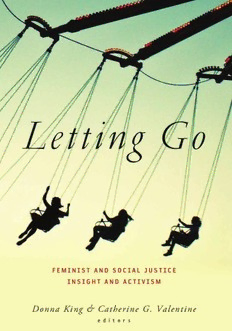
Letting Go: Feminist and Social Justice Insight and Activism PDF
Preview Letting Go: Feminist and Social Justice Insight and Activism
Letting Go Letting Go Feminist and Social Justice Insight and Activism Donna King and Catherine (Kay) G. Valentine, EDITORS VANDERBILT UNIVERSITY PRESS NASHVILLE ©2015 by Vanderbilt University Press Nashville, Tennessee 37235 All rights reserved First printing 2015 This book is printed on acid-free paper. Manufactured in the United States of America Library of Congress Cataloging-in-Publication Data on file LC control number 2014045417 LC classification HQ1155.L47 2015 Dewey class number 305.42—dc23 ISBN 978-0-8265-2065-4 (hardcover) ISBN 978-0-8265-2066-1 (paperback) ISBN 978-0-8265-2067-8 (ebook) CONTENTS Introduction Letting Go Feminism: Reconnecting Self-Care and Social Justice 1 Catherine (Kay) G. Valentine Part One: Theoretical Perspectives 1 Toward a Feminist Theory of Letting Go 15 Donna King 2 On the Interdependence of Personal and Social Transformation 33 David R. Loy 3 Leaning In and Letting Go: Feminist Tools for Valuing Nonwork 47 Jennifer Randles 4 Letting Go of Normal when “Normal” Is Pathological, or Why Feminism Is a Gift to Men 57 Robert Jensen Part Two: Personal Essays 5 When “Straight-Acting” Lost Its Luster: Letting Go of Masculine Privilege 69 Anthony C. Ocampo 6 The Gold Pen 81 Deborah J. Cohan 7 Whether Willing or Unwilling: The Personal, the Professional, and Two Years of Too Much 91 Meghan M. Sweeney 8 Letting Go: How Does a Feminist Retire? 103 Diane E. Levy 9 When Enough Is Enough: African American Women Reclaiming Themselves 113 Shirley A. Jackson Part Three: Ethnographies 10 What to Let Go: Insights from Online Cervical Cancer Narratives 127 Tracy B. Citeroni 11 Stay-at-Home Fathers: Are Domestic Men Bucking Hegemonic Masculinity? 139 Steven Farough 12 From Retail Banking to Credit Counseling: Opting Out and Tuning In 151 Kevin J. Delaney 13 Keeping Up Appearances: Working Class Feminists Speak Out about the Success Model in Academia 161 Roxanne Gerbrandt and Liza Kurtz 14 Letting Go and Having Fun: Redefining Aging in America 173 Deana A. Rohlinger and Haley Gentile Part Four: Ecological Perspectives 15 Letting Go and Getting Real: Applying Buddhist Principles to Address Environmental Crisis 187 Janine Schipper 16 Consuming Violence: Oil and Food in Everyday Life 201 Patricia Widener 17 Growing Food, Growing Justice: Letting Go by Holding On to the Feminine Principle 211 Leontina Hormel and Ryanne Pilgeram Part Five: Visionary Feminism 18 Dig Deep: Beyond Lean In 225 bell hooks Contributors 235 Index 239 vi Letting Go INTRODUCTION Letting Go Feminism Reconnecting Self-Care and Social Justice Catherine (Kay) G. Valentine What is letting go and how might it contribute to feminist and social justice in- sight and activism? In this introduction we address this question by explicitly critiquing neoliberal feminism and the radical individualism it promotes as ex- emplified in Sheryl Sandberg’s Lean In (2013). A letting go feminist perspective as we envision it demands a radical rec- ognition that the values and structures of our neoliberal (competitive, striving, accumulating, consuming, exploiting, oppressive) society are harmful and de- structive both on a personal level (something some of the more privileged of us discover when we can’t “keep up” with performance demands, for example) AND, especially important, on a social and environmental level. In other words, letting go is a practice of self-awareness in the service of a more humane, inter- connected, interdependent social system, and it is a critique and rejection of unreflective neoliberal individualism and its destructive social forms and struc- tures. We argue that a feminist letting go and its attendant self-care has the po- tential to be a radical act of awakening to social and environmental injustice and a call to activism for more humane and sustainable alternative structures. This is our basic orientation in moving toward a feminist theory of letting go and thus the context of this book. In what follows we briefly define neoliberal capitalism and neoliberal femi- nism, offer a short critique of neoliberal feminism’s notion of care, further dis- cuss the theory and practice of letting go, and show how the contributions in this collection address these issues from various perspectives. While our fo- cus is the contemporary United States, the issues are global in their reach and consequences. Neoliberal Capitalism Neoliberal capitalism is an ideology and a form of political economy that favors unregulated markets and radical individualism. Neoliberalism emphasizes the 1
